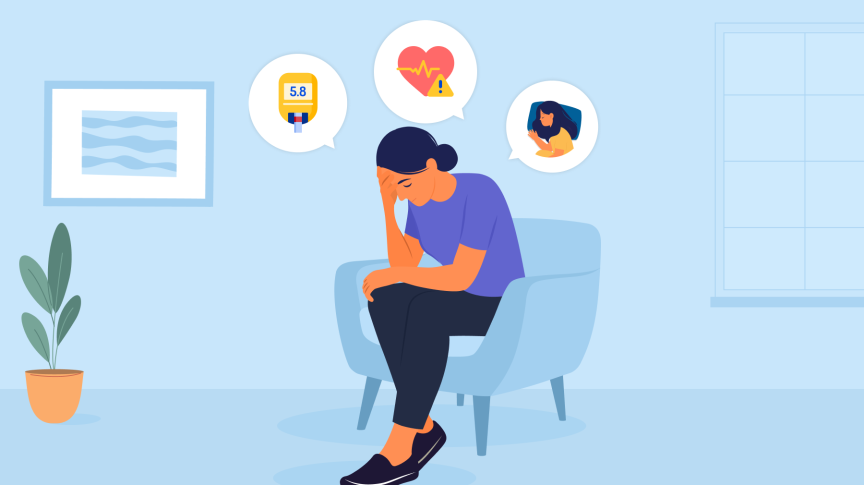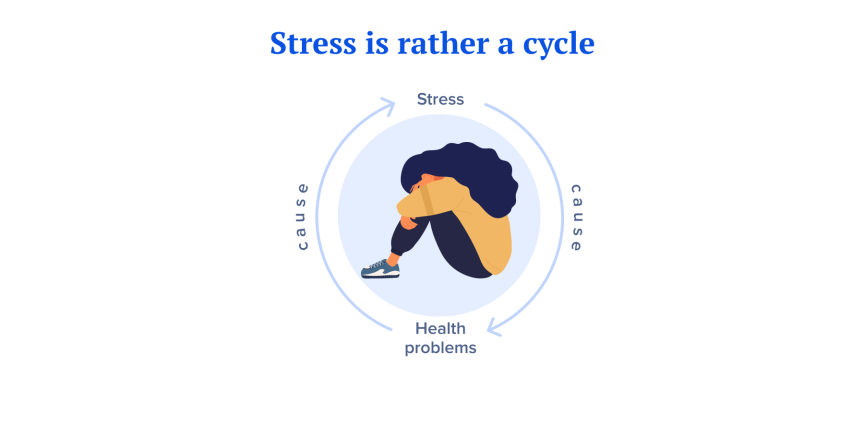Learn why leading HR professionals trust ekincare! Explore Now

Is stress a cause or an effect?
As per The World Health Organization’s definition, health is "a state of total physical, mental and social well-being - not simply the absence of disease or disability".
Most of us are aware that stress is responsible for causing many health conditions. Let us now try and understand if it is the cause, effect or both.

When there is a stressor, the response to stress causes wear and tear on the body and organ systems, which reduces optimum health, and in fact increases the body’s sensitivity to stress!

As per The American Institute of Stress:
The Occupational Safety and Health Administration (OSHA) has declared stress as a workplace hazard.
a. Physical
It is now widely recognised that severe or chronic stress, particularly when coupled with a lack of predictability or perceived lack of control, can cause a variety of long-lasting physiological changes that wreak havoc on multiple organ systems.
a. i) Nervous system
a. ii) Cardiovascular system
a. iii) Respiratory system
a. iv) Gastro intestinal system
a. v) Musculoskeletal system
a. vi) Reproductive system
In males
In females
Diseases of the reproductive system
When stress is high, there are higher chances of aggravating symptoms of reproductive diseases, such as the herpes simplex virus or Polycystic Ovarian Syndrome (PCOS).
a. vii) Immune system
Skin and hair - Stress can cause problems such as acne, psoriasis, eczema, and permanent hair loss.

b. Psychological
Stress affects our emotional and mental state. When it becomes overwhelming and prolonged, it increases the risk of mental health challenges. Stress can either directly cause or acts as a precipitating factor in already vulnerable persons. People who don't experience the full range of symptoms to be diagnosed with any mental health disorder can still experience varied symptoms like:
c. Cognitive functions
“Cognitive functions” broadly refer to mental processes related to acquiring knowledge, manipulation of information, and logical reasoning.
Stress can affect cognitive functions in the short term as well as over the long term. Chronic stress has consistently been associated with poor cognitive function, faster cognitive decline, and higher incidences of dementia. The cognitive symptoms include:
d. Communication
Stress can interfere with thinking and speech. One can easily get frustrated, can have difficulty choosing words carefully and have trouble expressing things in an appropriate way. There is a tendency to give confusing non-verbal signals and misunderstand the other person’s intentions. Another area stress can affect communication is public speaking - it can cause significant anxiety and might lead to the activation of the fight-or-flight response.
e. Addictions
Stress is a well-documented risk factor in the development of addiction and in higher vulnerability to addiction relapse. People under stress have difficulty controlling their urges. The strong linkage between stress and addiction is the self-medication theory, which suggests that the person may resort to addictions to cope with the tension associated with stressors.
Addictions could be:
f. Interpersonal relationships
Stress can spill from one area into other areas of our lives, affecting the quality of our close relationships. It can create a negative cycle where partners “catch” each other’s stress. It can bring out a person's worst traits and increase vigilance, wherein one is more likely to notice negative behaviours and react to them in unhealthy ways. Stress can make one show less interest, empathy and affection, and can cause withdrawal from friends and family. It can interfere with one's ability to resolve conflict in relationships
g. Organizations
In a survey of Indian workers, 70% reported that they experienced stress at least once during the working week on a regular basis. Stress levels in the Indian workforce are much higher than the Asia-Pacific average of 60%.
Employees' stress can have a negative impact on overall business and organisational productivity and efficiency. It can also produce counter-productive work behaviours. The effect of stress at the workplace may include:
Stress, though commonly experienced, provided the nature of its impact on various aspects of our health and day-to-day functioning, should not be ignored. It is one of the reversible causes of low productivity and mental health, which when efficiently identified and managed can prevent many health-related issues.
Schedule a demo to learn how your organisation can get the best employee health and well-being experience with ekincare's commitment to quality.